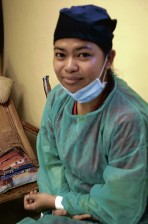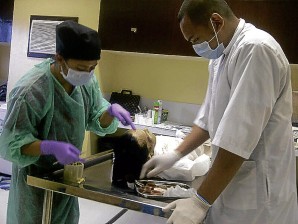Embalming will never be a ‘dead-end’ job for May

“IT’S HARDER to talk to the living,” says 28-year-old Cardenas (left) in jest on why she left a well-paying job in a call center to work instead in the death care industry. “There are a few crazy folks like us.” PHOTOS BY NIÑA CALLEJA
She treats her eight-hour job both as a science and an art—but one with an unforgiving “deadline.”
On a typical workday, May Cardenas, a 28-year-old biology graduate of the University of the Philippines in Los Baños, dons a head cap, a lab gown, a face mask, gloves and goggles— all to give the best care the dead deserves.
Cardenas may be a fun-loving friend to her peers and a stylish dresser off-duty, but she can be dead serious about her job as an embalmer. Aside from smashing the horror-movie stereotypes of funeral workers being of the silent, eerie type, she has resolutely broken into the male-dominated trade.
“There are a few crazy folks like us,” Cardenas said in jest in an Inquirer interview at City Funeral, a local government-run funeral home near the public cemetery in Mandaluyong City.
She has been an embalmer for three years, the last year spent at City Funeral. She is also a part-time lecturer in an embalming training class in Makati City.
She noted that women are still a rarity in the job and that most of the females in her class are either owners of funeral parlors or those who just want to learn the business side and would leave the actual embalming to other workers.
The job had simply fascinated her since her teenage years, she said. “Back in high school, when you are asked what you want to be when you grow up, I had wanted to put in the yearbook that I want to be an embalmer. But it looked ludicrous so instead I wrote that I wanted to be a doctor.”
“Everyone wanted be a teacher, a doctor, an engineer, a nurse. But I wanted to do something else,” said Cardenas, whose siblings included an engineer, a veterinarian and an agriculturist. Nobody in the family had worked in funeral homes before.
At first, she only hinted at this dream in her conversations with her parents, who thought she really wanted to be a physician and advised her to take biology for her pre-med studies. She gave the course a try and actually “enjoyed it” for the lab work.
It was after graduation that she faced a tough decision— whether or not to pursue medicine. She did well in the National Medical Admission Test and later began looking for the school where she can enroll.
“But I just couldn’t do it,” she recalled.
“Mas mahirap kausapin ang buhay (It’s harder to talk to the living),” she joked, when asked what could be the deeper reason for her career choice. “There’s a curiosity factor. I am curious more than I am afraid.”
This curiosity may have been sparked by a childhood memory. One summer day, she recalled, she and her siblings were roaming in the local cemetery on their bicycles in their father’s hometown in Davao when they saw a group of men transferring bones from the tombs.
“After that, we kept coming back to that cemetery to play with the remaining bones,” she said.
Still, Cardenas had to wait for six years after graduation before getting her dream job. She first found work in a call center.
“But then (pun apparently intended) it was a dead-end job for me,” she said. “Yes, I was well-paid. But I also needed to grow.”
A window finally opened in 2010. A day before the wedding of a college friend who owned funeral parlors in Albay province, she asked permission to observe how the dead is embalmed. The next day, on the wedding day itself, she was already sure of her decision.
Her parents gave her a vehement “No” when she told them about it, and suggested that she pursue further studies instead if she wished.
“But at that time, I was no longer asking their permission. I already had the money to pay for the review class for my embalming licensure exam,” she said.
“They eventually realized that I would be at peace in this line of work, that I would no longer whine or go on shopping sprees when depressed,” she said.
As a show of support, her mother even paid for her review classes.
After finishing a three-month review course in Cebu City and passing the licensure exam at the Department of Health in Manila, she got hired as an embalmer at La Funeraria Paz in Quezon City.
Is she still afraid of corpses suddenly coming alive at the funeral lab? Next question, please. She said she’s actually more scared of cockroaches and rats. And don’t talk to her about horror films and novels, for she’s never been a big fan.
An embalmer in Metro Manila gets a minimum pay of P400 per day, “not enough to feed a family,” she said. But despite the meager wage, she had never thought of leaving the job.
She even plans to take further studies on death care abroad. “I don’t want to be an embalmer forever, of course. I’d also want to learn how to mix chemicals and make other materials (for the dead),” she said.
Earlier this year, Cardenas wrote an essay that appeared in the Inquirer Youngblood column, where she explained that embalming is an important and “honest” profession for “it is the final service done for a departed loved one.”















